A Report on Leadership and Change Management in the NHS Context
VerifiedAdded on 2022/12/27
|13
|4236
|36
Report
AI Summary
This report delves into the critical aspects of leadership and change management within the National Health Service (NHS), focusing on how these elements influence the delivery of healthcare services. The report begins by exploring various leadership and change management theories, frameworks, and tools, such as behavioral theory, contingency theory, the Great Man theory, Lewin's change theory, and the ADKAR change model, illustrating their application in a healthcare context. It then examines the importance of ethical leadership within organizations, emphasizing the role of honesty, justice, respect, and integrity in fostering a positive work environment and achieving organizational goals. Finally, the report analyzes methods for addressing resistance to change, discussing the benefits and problems associated with introducing change within the NHS. The report highlights the significance of effective leadership in navigating challenges, improving patient care, and ensuring the successful implementation of changes in the healthcare sector.
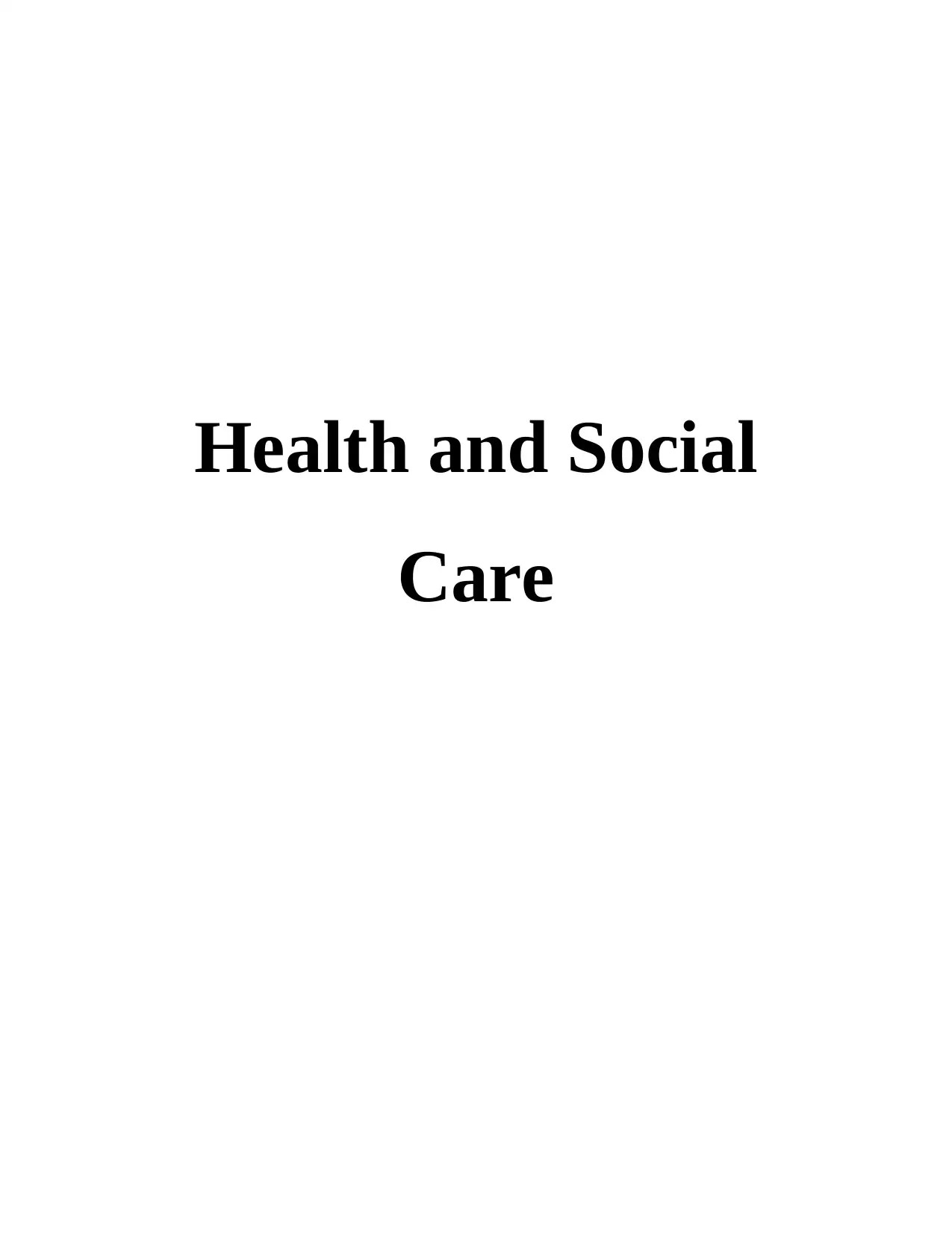
Health and Social
Care
Care
Paraphrase This Document
Need a fresh take? Get an instant paraphrase of this document with our AI Paraphraser
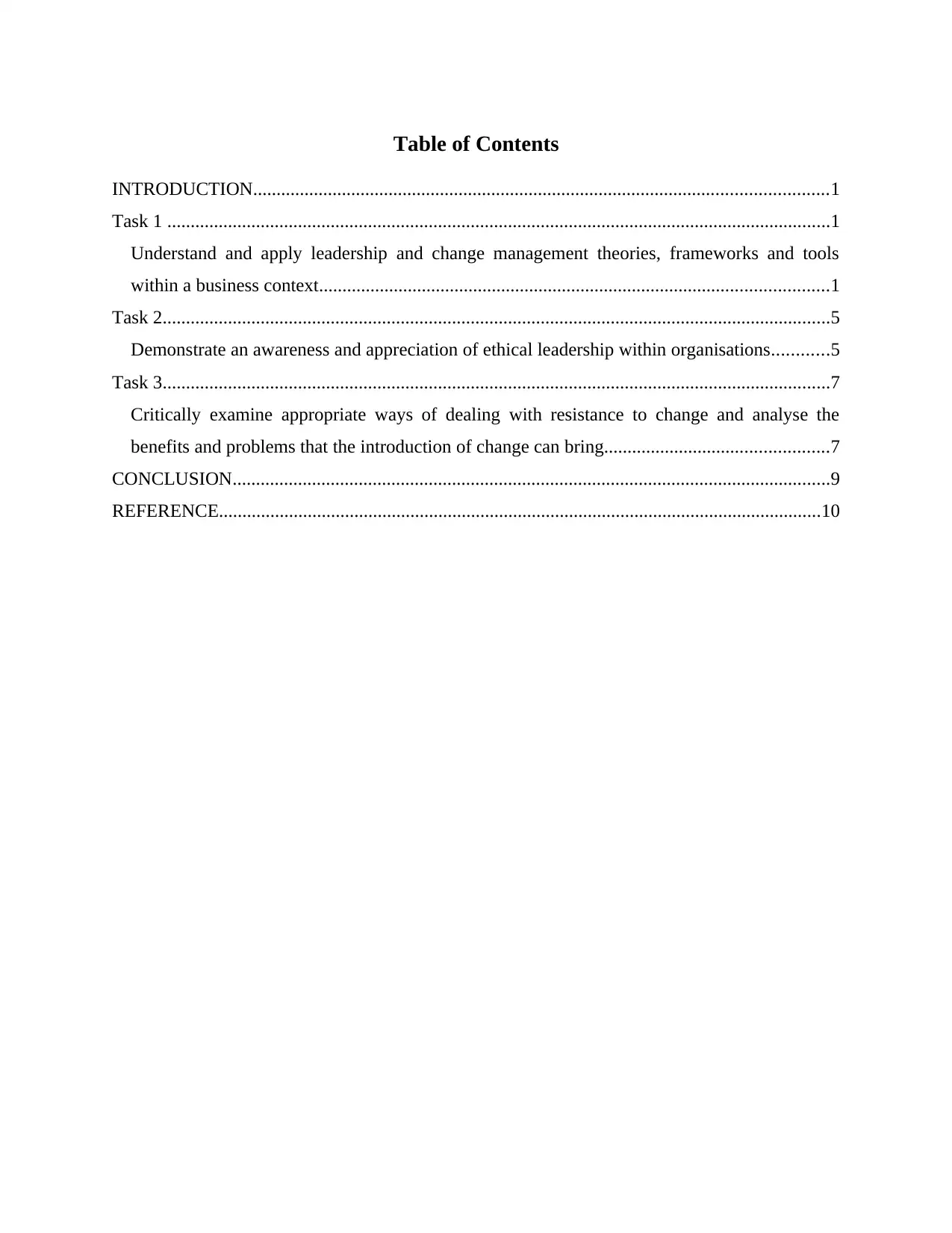
Table of Contents
INTRODUCTION...........................................................................................................................1
Task 1 ..............................................................................................................................................1
Understand and apply leadership and change management theories, frameworks and tools
within a business context.............................................................................................................1
Task 2...............................................................................................................................................5
Demonstrate an awareness and appreciation of ethical leadership within organisations............5
Task 3...............................................................................................................................................7
Critically examine appropriate ways of dealing with resistance to change and analyse the
benefits and problems that the introduction of change can bring................................................7
CONCLUSION................................................................................................................................9
REFERENCE.................................................................................................................................10
INTRODUCTION...........................................................................................................................1
Task 1 ..............................................................................................................................................1
Understand and apply leadership and change management theories, frameworks and tools
within a business context.............................................................................................................1
Task 2...............................................................................................................................................5
Demonstrate an awareness and appreciation of ethical leadership within organisations............5
Task 3...............................................................................................................................................7
Critically examine appropriate ways of dealing with resistance to change and analyse the
benefits and problems that the introduction of change can bring................................................7
CONCLUSION................................................................................................................................9
REFERENCE.................................................................................................................................10

⊘ This is a preview!⊘
Do you want full access?
Subscribe today to unlock all pages.

Trusted by 1+ million students worldwide
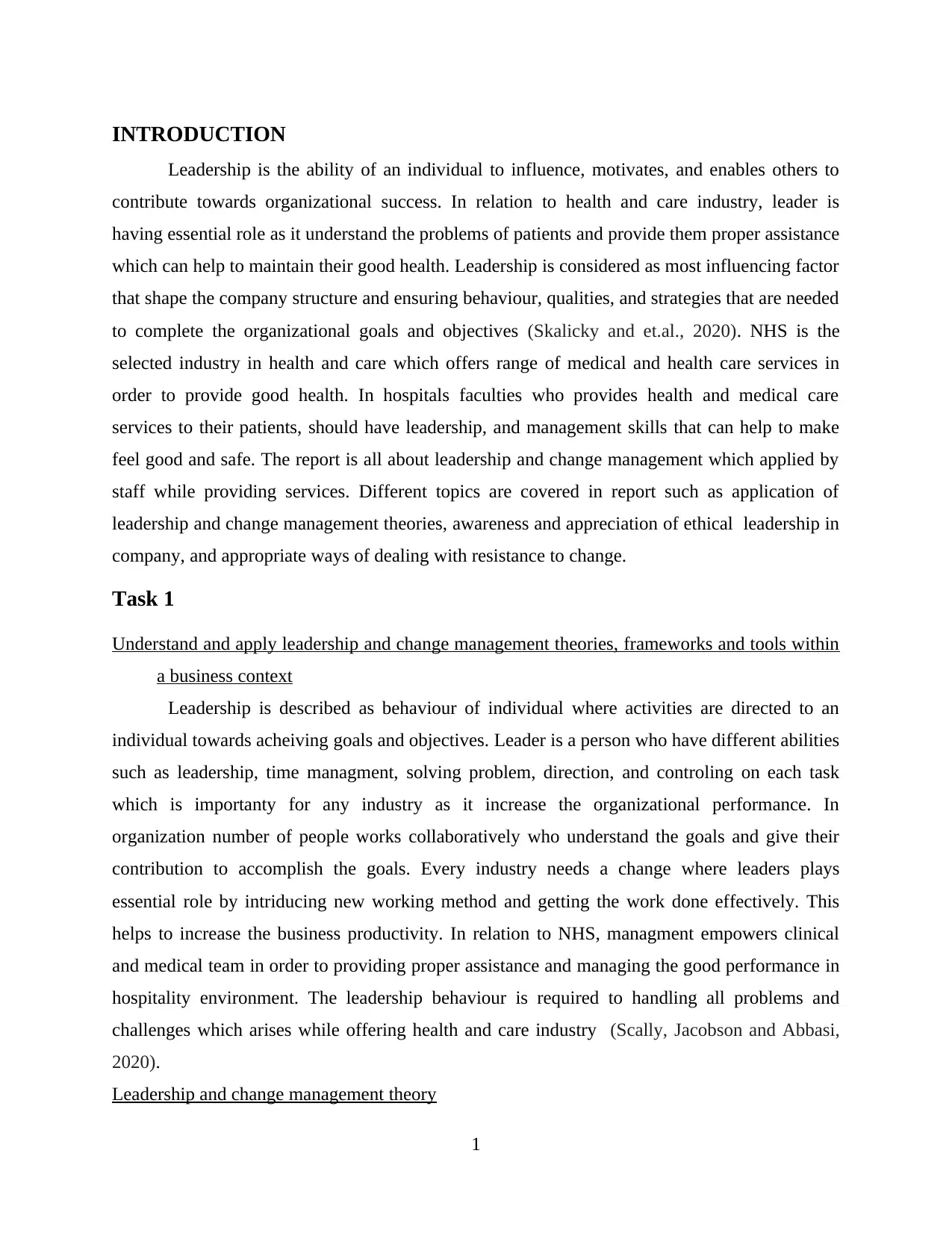
INTRODUCTION
Leadership is the ability of an individual to influence, motivates, and enables others to
contribute towards organizational success. In relation to health and care industry, leader is
having essential role as it understand the problems of patients and provide them proper assistance
which can help to maintain their good health. Leadership is considered as most influencing factor
that shape the company structure and ensuring behaviour, qualities, and strategies that are needed
to complete the organizational goals and objectives (Skalicky and et.al., 2020). NHS is the
selected industry in health and care which offers range of medical and health care services in
order to provide good health. In hospitals faculties who provides health and medical care
services to their patients, should have leadership, and management skills that can help to make
feel good and safe. The report is all about leadership and change management which applied by
staff while providing services. Different topics are covered in report such as application of
leadership and change management theories, awareness and appreciation of ethical leadership in
company, and appropriate ways of dealing with resistance to change.
Task 1
Understand and apply leadership and change management theories, frameworks and tools within
a business context
Leadership is described as behaviour of individual where activities are directed to an
individual towards acheiving goals and objectives. Leader is a person who have different abilities
such as leadership, time managment, solving problem, direction, and controling on each task
which is importanty for any industry as it increase the organizational performance. In
organization number of people works collaboratively who understand the goals and give their
contribution to accomplish the goals. Every industry needs a change where leaders plays
essential role by intriducing new working method and getting the work done effectively. This
helps to increase the business productivity. In relation to NHS, managment empowers clinical
and medical team in order to providing proper assistance and managing the good performance in
hospitality environment. The leadership behaviour is required to handling all problems and
challenges which arises while offering health and care industry (Scally, Jacobson and Abbasi,
2020).
Leadership and change management theory
1
Leadership is the ability of an individual to influence, motivates, and enables others to
contribute towards organizational success. In relation to health and care industry, leader is
having essential role as it understand the problems of patients and provide them proper assistance
which can help to maintain their good health. Leadership is considered as most influencing factor
that shape the company structure and ensuring behaviour, qualities, and strategies that are needed
to complete the organizational goals and objectives (Skalicky and et.al., 2020). NHS is the
selected industry in health and care which offers range of medical and health care services in
order to provide good health. In hospitals faculties who provides health and medical care
services to their patients, should have leadership, and management skills that can help to make
feel good and safe. The report is all about leadership and change management which applied by
staff while providing services. Different topics are covered in report such as application of
leadership and change management theories, awareness and appreciation of ethical leadership in
company, and appropriate ways of dealing with resistance to change.
Task 1
Understand and apply leadership and change management theories, frameworks and tools within
a business context
Leadership is described as behaviour of individual where activities are directed to an
individual towards acheiving goals and objectives. Leader is a person who have different abilities
such as leadership, time managment, solving problem, direction, and controling on each task
which is importanty for any industry as it increase the organizational performance. In
organization number of people works collaboratively who understand the goals and give their
contribution to accomplish the goals. Every industry needs a change where leaders plays
essential role by intriducing new working method and getting the work done effectively. This
helps to increase the business productivity. In relation to NHS, managment empowers clinical
and medical team in order to providing proper assistance and managing the good performance in
hospitality environment. The leadership behaviour is required to handling all problems and
challenges which arises while offering health and care industry (Scally, Jacobson and Abbasi,
2020).
Leadership and change management theory
1
Paraphrase This Document
Need a fresh take? Get an instant paraphrase of this document with our AI Paraphraser
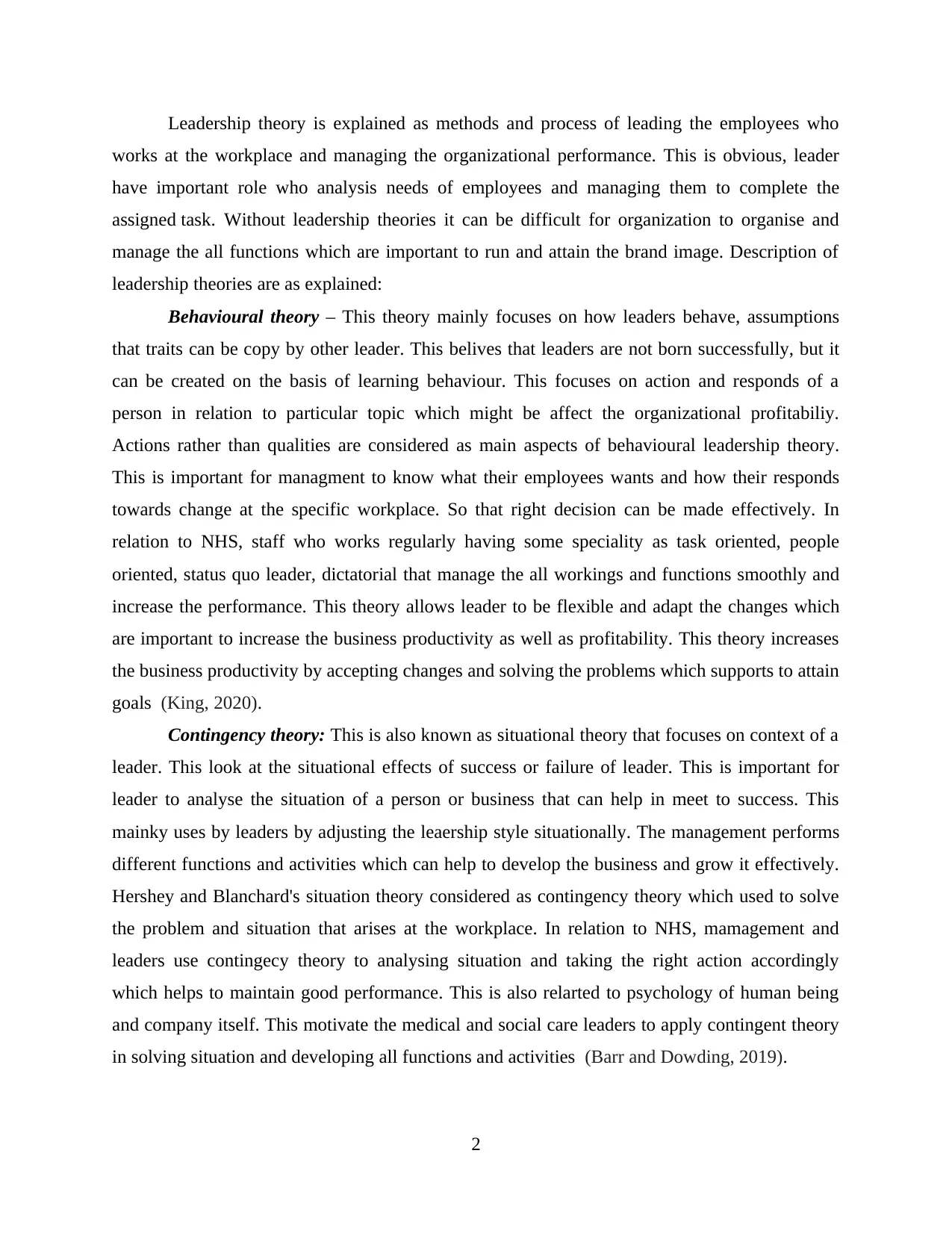
Leadership theory is explained as methods and process of leading the employees who
works at the workplace and managing the organizational performance. This is obvious, leader
have important role who analysis needs of employees and managing them to complete the
assigned task. Without leadership theories it can be difficult for organization to organise and
manage the all functions which are important to run and attain the brand image. Description of
leadership theories are as explained:
Behavioural theory – This theory mainly focuses on how leaders behave, assumptions
that traits can be copy by other leader. This belives that leaders are not born successfully, but it
can be created on the basis of learning behaviour. This focuses on action and responds of a
person in relation to particular topic which might be affect the organizational profitabiliy.
Actions rather than qualities are considered as main aspects of behavioural leadership theory.
This is important for managment to know what their employees wants and how their responds
towards change at the specific workplace. So that right decision can be made effectively. In
relation to NHS, staff who works regularly having some speciality as task oriented, people
oriented, status quo leader, dictatorial that manage the all workings and functions smoothly and
increase the performance. This theory allows leader to be flexible and adapt the changes which
are important to increase the business productivity as well as profitability. This theory increases
the business productivity by accepting changes and solving the problems which supports to attain
goals (King, 2020).
Contingency theory: This is also known as situational theory that focuses on context of a
leader. This look at the situational effects of success or failure of leader. This is important for
leader to analyse the situation of a person or business that can help in meet to success. This
mainky uses by leaders by adjusting the leaership style situationally. The management performs
different functions and activities which can help to develop the business and grow it effectively.
Hershey and Blanchard's situation theory considered as contingency theory which used to solve
the problem and situation that arises at the workplace. In relation to NHS, mamagement and
leaders use contingecy theory to analysing situation and taking the right action accordingly
which helps to maintain good performance. This is also relarted to psychology of human being
and company itself. This motivate the medical and social care leaders to apply contingent theory
in solving situation and developing all functions and activities (Barr and Dowding, 2019).
2
works at the workplace and managing the organizational performance. This is obvious, leader
have important role who analysis needs of employees and managing them to complete the
assigned task. Without leadership theories it can be difficult for organization to organise and
manage the all functions which are important to run and attain the brand image. Description of
leadership theories are as explained:
Behavioural theory – This theory mainly focuses on how leaders behave, assumptions
that traits can be copy by other leader. This belives that leaders are not born successfully, but it
can be created on the basis of learning behaviour. This focuses on action and responds of a
person in relation to particular topic which might be affect the organizational profitabiliy.
Actions rather than qualities are considered as main aspects of behavioural leadership theory.
This is important for managment to know what their employees wants and how their responds
towards change at the specific workplace. So that right decision can be made effectively. In
relation to NHS, staff who works regularly having some speciality as task oriented, people
oriented, status quo leader, dictatorial that manage the all workings and functions smoothly and
increase the performance. This theory allows leader to be flexible and adapt the changes which
are important to increase the business productivity as well as profitability. This theory increases
the business productivity by accepting changes and solving the problems which supports to attain
goals (King, 2020).
Contingency theory: This is also known as situational theory that focuses on context of a
leader. This look at the situational effects of success or failure of leader. This is important for
leader to analyse the situation of a person or business that can help in meet to success. This
mainky uses by leaders by adjusting the leaership style situationally. The management performs
different functions and activities which can help to develop the business and grow it effectively.
Hershey and Blanchard's situation theory considered as contingency theory which used to solve
the problem and situation that arises at the workplace. In relation to NHS, mamagement and
leaders use contingecy theory to analysing situation and taking the right action accordingly
which helps to maintain good performance. This is also relarted to psychology of human being
and company itself. This motivate the medical and social care leaders to apply contingent theory
in solving situation and developing all functions and activities (Barr and Dowding, 2019).
2
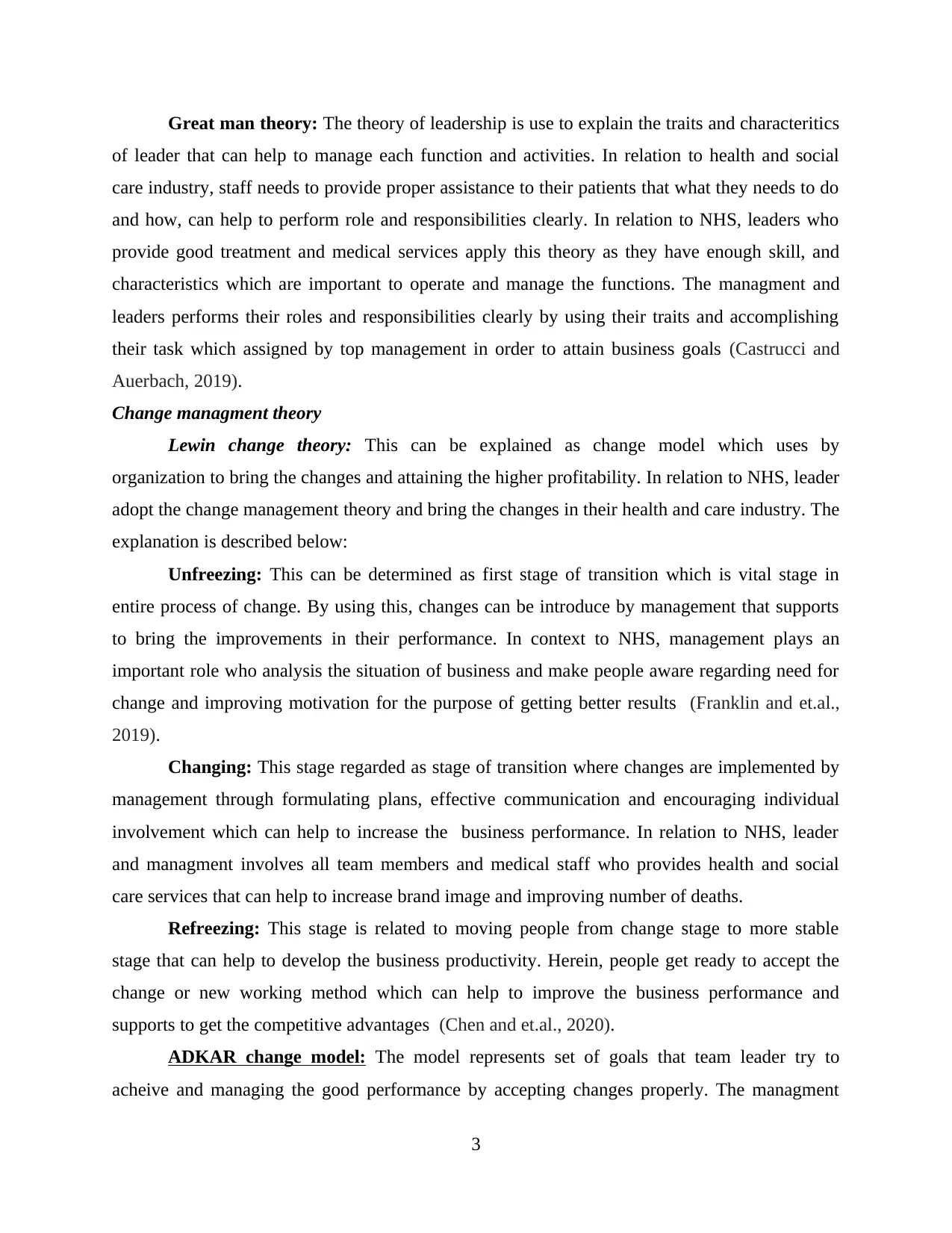
Great man theory: The theory of leadership is use to explain the traits and characteritics
of leader that can help to manage each function and activities. In relation to health and social
care industry, staff needs to provide proper assistance to their patients that what they needs to do
and how, can help to perform role and responsibilities clearly. In relation to NHS, leaders who
provide good treatment and medical services apply this theory as they have enough skill, and
characteristics which are important to operate and manage the functions. The managment and
leaders performs their roles and responsibilities clearly by using their traits and accomplishing
their task which assigned by top management in order to attain business goals (Castrucci and
Auerbach, 2019).
Change managment theory
Lewin change theory: This can be explained as change model which uses by
organization to bring the changes and attaining the higher profitability. In relation to NHS, leader
adopt the change management theory and bring the changes in their health and care industry. The
explanation is described below:
Unfreezing: This can be determined as first stage of transition which is vital stage in
entire process of change. By using this, changes can be introduce by management that supports
to bring the improvements in their performance. In context to NHS, management plays an
important role who analysis the situation of business and make people aware regarding need for
change and improving motivation for the purpose of getting better results (Franklin and et.al.,
2019).
Changing: This stage regarded as stage of transition where changes are implemented by
management through formulating plans, effective communication and encouraging individual
involvement which can help to increase the business performance. In relation to NHS, leader
and managment involves all team members and medical staff who provides health and social
care services that can help to increase brand image and improving number of deaths.
Refreezing: This stage is related to moving people from change stage to more stable
stage that can help to develop the business productivity. Herein, people get ready to accept the
change or new working method which can help to improve the business performance and
supports to get the competitive advantages (Chen and et.al., 2020).
ADKAR change model: The model represents set of goals that team leader try to
acheive and managing the good performance by accepting changes properly. The managment
3
of leader that can help to manage each function and activities. In relation to health and social
care industry, staff needs to provide proper assistance to their patients that what they needs to do
and how, can help to perform role and responsibilities clearly. In relation to NHS, leaders who
provide good treatment and medical services apply this theory as they have enough skill, and
characteristics which are important to operate and manage the functions. The managment and
leaders performs their roles and responsibilities clearly by using their traits and accomplishing
their task which assigned by top management in order to attain business goals (Castrucci and
Auerbach, 2019).
Change managment theory
Lewin change theory: This can be explained as change model which uses by
organization to bring the changes and attaining the higher profitability. In relation to NHS, leader
adopt the change management theory and bring the changes in their health and care industry. The
explanation is described below:
Unfreezing: This can be determined as first stage of transition which is vital stage in
entire process of change. By using this, changes can be introduce by management that supports
to bring the improvements in their performance. In context to NHS, management plays an
important role who analysis the situation of business and make people aware regarding need for
change and improving motivation for the purpose of getting better results (Franklin and et.al.,
2019).
Changing: This stage regarded as stage of transition where changes are implemented by
management through formulating plans, effective communication and encouraging individual
involvement which can help to increase the business performance. In relation to NHS, leader
and managment involves all team members and medical staff who provides health and social
care services that can help to increase brand image and improving number of deaths.
Refreezing: This stage is related to moving people from change stage to more stable
stage that can help to develop the business productivity. Herein, people get ready to accept the
change or new working method which can help to improve the business performance and
supports to get the competitive advantages (Chen and et.al., 2020).
ADKAR change model: The model represents set of goals that team leader try to
acheive and managing the good performance by accepting changes properly. The managment
3
⊘ This is a preview!⊘
Do you want full access?
Subscribe today to unlock all pages.

Trusted by 1+ million students worldwide
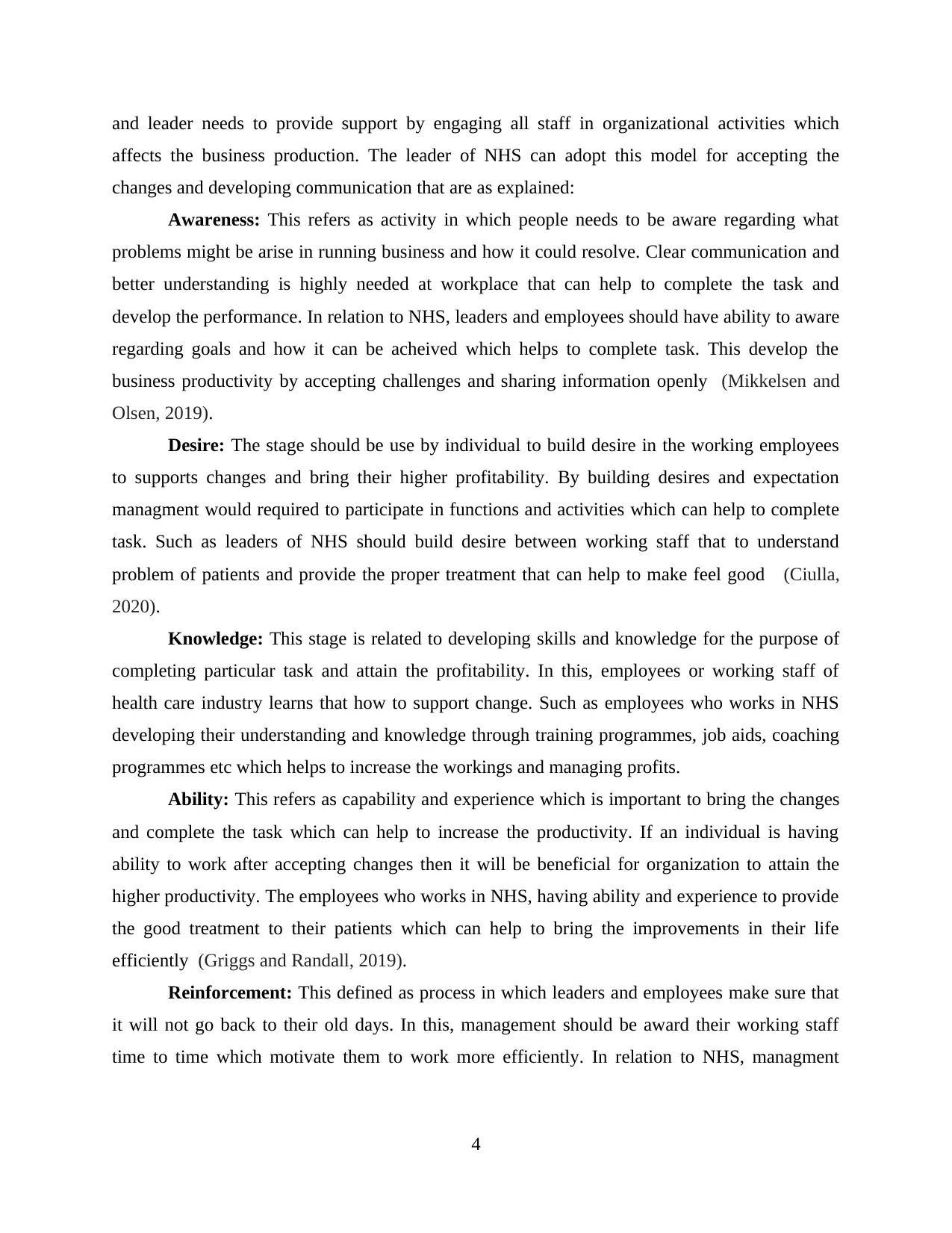
and leader needs to provide support by engaging all staff in organizational activities which
affects the business production. The leader of NHS can adopt this model for accepting the
changes and developing communication that are as explained:
Awareness: This refers as activity in which people needs to be aware regarding what
problems might be arise in running business and how it could resolve. Clear communication and
better understanding is highly needed at workplace that can help to complete the task and
develop the performance. In relation to NHS, leaders and employees should have ability to aware
regarding goals and how it can be acheived which helps to complete task. This develop the
business productivity by accepting challenges and sharing information openly (Mikkelsen and
Olsen, 2019).
Desire: The stage should be use by individual to build desire in the working employees
to supports changes and bring their higher profitability. By building desires and expectation
managment would required to participate in functions and activities which can help to complete
task. Such as leaders of NHS should build desire between working staff that to understand
problem of patients and provide the proper treatment that can help to make feel good (Ciulla,
2020).
Knowledge: This stage is related to developing skills and knowledge for the purpose of
completing particular task and attain the profitability. In this, employees or working staff of
health care industry learns that how to support change. Such as employees who works in NHS
developing their understanding and knowledge through training programmes, job aids, coaching
programmes etc which helps to increase the workings and managing profits.
Ability: This refers as capability and experience which is important to bring the changes
and complete the task which can help to increase the productivity. If an individual is having
ability to work after accepting changes then it will be beneficial for organization to attain the
higher productivity. The employees who works in NHS, having ability and experience to provide
the good treatment to their patients which can help to bring the improvements in their life
efficiently (Griggs and Randall, 2019).
Reinforcement: This defined as process in which leaders and employees make sure that
it will not go back to their old days. In this, management should be award their working staff
time to time which motivate them to work more efficiently. In relation to NHS, managment
4
affects the business production. The leader of NHS can adopt this model for accepting the
changes and developing communication that are as explained:
Awareness: This refers as activity in which people needs to be aware regarding what
problems might be arise in running business and how it could resolve. Clear communication and
better understanding is highly needed at workplace that can help to complete the task and
develop the performance. In relation to NHS, leaders and employees should have ability to aware
regarding goals and how it can be acheived which helps to complete task. This develop the
business productivity by accepting challenges and sharing information openly (Mikkelsen and
Olsen, 2019).
Desire: The stage should be use by individual to build desire in the working employees
to supports changes and bring their higher profitability. By building desires and expectation
managment would required to participate in functions and activities which can help to complete
task. Such as leaders of NHS should build desire between working staff that to understand
problem of patients and provide the proper treatment that can help to make feel good (Ciulla,
2020).
Knowledge: This stage is related to developing skills and knowledge for the purpose of
completing particular task and attain the profitability. In this, employees or working staff of
health care industry learns that how to support change. Such as employees who works in NHS
developing their understanding and knowledge through training programmes, job aids, coaching
programmes etc which helps to increase the workings and managing profits.
Ability: This refers as capability and experience which is important to bring the changes
and complete the task which can help to increase the productivity. If an individual is having
ability to work after accepting changes then it will be beneficial for organization to attain the
higher productivity. The employees who works in NHS, having ability and experience to provide
the good treatment to their patients which can help to bring the improvements in their life
efficiently (Griggs and Randall, 2019).
Reinforcement: This defined as process in which leaders and employees make sure that
it will not go back to their old days. In this, management should be award their working staff
time to time which motivate them to work more efficiently. In relation to NHS, managment
4
Paraphrase This Document
Need a fresh take? Get an instant paraphrase of this document with our AI Paraphraser
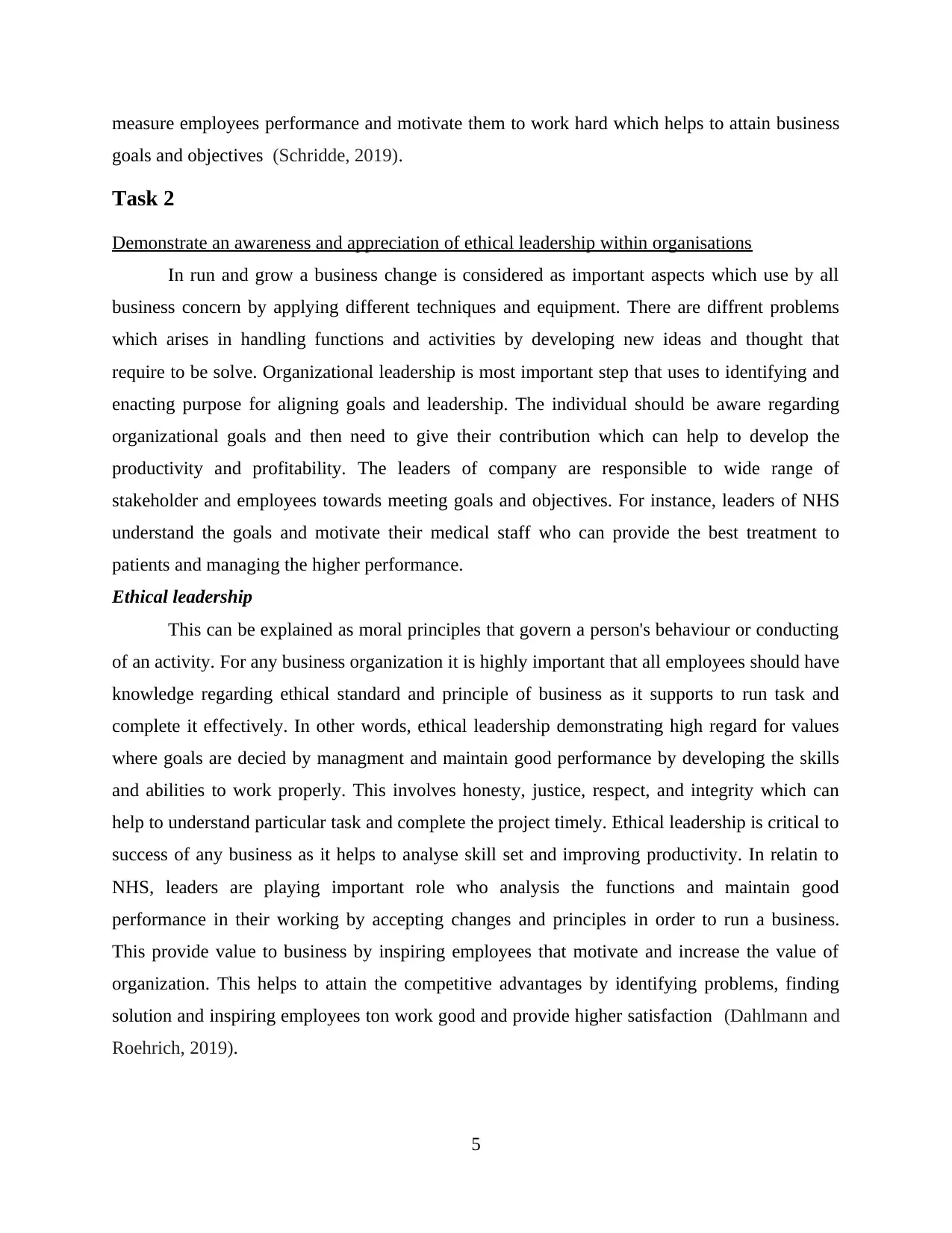
measure employees performance and motivate them to work hard which helps to attain business
goals and objectives (Schridde, 2019).
Task 2
Demonstrate an awareness and appreciation of ethical leadership within organisations
In run and grow a business change is considered as important aspects which use by all
business concern by applying different techniques and equipment. There are diffrent problems
which arises in handling functions and activities by developing new ideas and thought that
require to be solve. Organizational leadership is most important step that uses to identifying and
enacting purpose for aligning goals and leadership. The individual should be aware regarding
organizational goals and then need to give their contribution which can help to develop the
productivity and profitability. The leaders of company are responsible to wide range of
stakeholder and employees towards meeting goals and objectives. For instance, leaders of NHS
understand the goals and motivate their medical staff who can provide the best treatment to
patients and managing the higher performance.
Ethical leadership
This can be explained as moral principles that govern a person's behaviour or conducting
of an activity. For any business organization it is highly important that all employees should have
knowledge regarding ethical standard and principle of business as it supports to run task and
complete it effectively. In other words, ethical leadership demonstrating high regard for values
where goals are decied by managment and maintain good performance by developing the skills
and abilities to work properly. This involves honesty, justice, respect, and integrity which can
help to understand particular task and complete the project timely. Ethical leadership is critical to
success of any business as it helps to analyse skill set and improving productivity. In relatin to
NHS, leaders are playing important role who analysis the functions and maintain good
performance in their working by accepting changes and principles in order to run a business.
This provide value to business by inspiring employees that motivate and increase the value of
organization. This helps to attain the competitive advantages by identifying problems, finding
solution and inspiring employees ton work good and provide higher satisfaction (Dahlmann and
Roehrich, 2019).
5
goals and objectives (Schridde, 2019).
Task 2
Demonstrate an awareness and appreciation of ethical leadership within organisations
In run and grow a business change is considered as important aspects which use by all
business concern by applying different techniques and equipment. There are diffrent problems
which arises in handling functions and activities by developing new ideas and thought that
require to be solve. Organizational leadership is most important step that uses to identifying and
enacting purpose for aligning goals and leadership. The individual should be aware regarding
organizational goals and then need to give their contribution which can help to develop the
productivity and profitability. The leaders of company are responsible to wide range of
stakeholder and employees towards meeting goals and objectives. For instance, leaders of NHS
understand the goals and motivate their medical staff who can provide the best treatment to
patients and managing the higher performance.
Ethical leadership
This can be explained as moral principles that govern a person's behaviour or conducting
of an activity. For any business organization it is highly important that all employees should have
knowledge regarding ethical standard and principle of business as it supports to run task and
complete it effectively. In other words, ethical leadership demonstrating high regard for values
where goals are decied by managment and maintain good performance by developing the skills
and abilities to work properly. This involves honesty, justice, respect, and integrity which can
help to understand particular task and complete the project timely. Ethical leadership is critical to
success of any business as it helps to analyse skill set and improving productivity. In relatin to
NHS, leaders are playing important role who analysis the functions and maintain good
performance in their working by accepting changes and principles in order to run a business.
This provide value to business by inspiring employees that motivate and increase the value of
organization. This helps to attain the competitive advantages by identifying problems, finding
solution and inspiring employees ton work good and provide higher satisfaction (Dahlmann and
Roehrich, 2019).
5
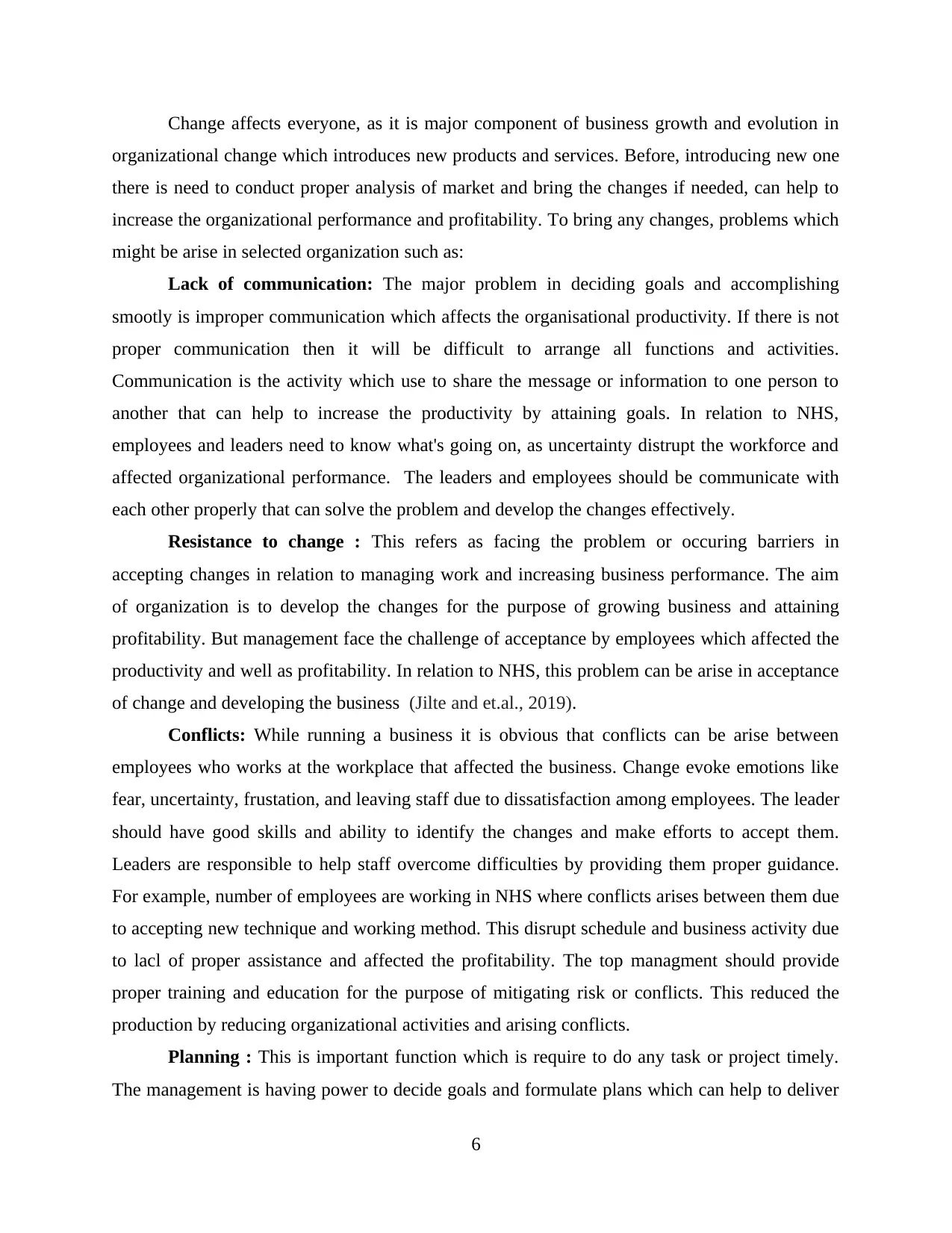
Change affects everyone, as it is major component of business growth and evolution in
organizational change which introduces new products and services. Before, introducing new one
there is need to conduct proper analysis of market and bring the changes if needed, can help to
increase the organizational performance and profitability. To bring any changes, problems which
might be arise in selected organization such as:
Lack of communication: The major problem in deciding goals and accomplishing
smootly is improper communication which affects the organisational productivity. If there is not
proper communication then it will be difficult to arrange all functions and activities.
Communication is the activity which use to share the message or information to one person to
another that can help to increase the productivity by attaining goals. In relation to NHS,
employees and leaders need to know what's going on, as uncertainty distrupt the workforce and
affected organizational performance. The leaders and employees should be communicate with
each other properly that can solve the problem and develop the changes effectively.
Resistance to change : This refers as facing the problem or occuring barriers in
accepting changes in relation to managing work and increasing business performance. The aim
of organization is to develop the changes for the purpose of growing business and attaining
profitability. But management face the challenge of acceptance by employees which affected the
productivity and well as profitability. In relation to NHS, this problem can be arise in acceptance
of change and developing the business (Jilte and et.al., 2019).
Conflicts: While running a business it is obvious that conflicts can be arise between
employees who works at the workplace that affected the business. Change evoke emotions like
fear, uncertainty, frustation, and leaving staff due to dissatisfaction among employees. The leader
should have good skills and ability to identify the changes and make efforts to accept them.
Leaders are responsible to help staff overcome difficulties by providing them proper guidance.
For example, number of employees are working in NHS where conflicts arises between them due
to accepting new technique and working method. This disrupt schedule and business activity due
to lacl of proper assistance and affected the profitability. The top managment should provide
proper training and education for the purpose of mitigating risk or conflicts. This reduced the
production by reducing organizational activities and arising conflicts.
Planning : This is important function which is require to do any task or project timely.
The management is having power to decide goals and formulate plans which can help to deliver
6
organizational change which introduces new products and services. Before, introducing new one
there is need to conduct proper analysis of market and bring the changes if needed, can help to
increase the organizational performance and profitability. To bring any changes, problems which
might be arise in selected organization such as:
Lack of communication: The major problem in deciding goals and accomplishing
smootly is improper communication which affects the organisational productivity. If there is not
proper communication then it will be difficult to arrange all functions and activities.
Communication is the activity which use to share the message or information to one person to
another that can help to increase the productivity by attaining goals. In relation to NHS,
employees and leaders need to know what's going on, as uncertainty distrupt the workforce and
affected organizational performance. The leaders and employees should be communicate with
each other properly that can solve the problem and develop the changes effectively.
Resistance to change : This refers as facing the problem or occuring barriers in
accepting changes in relation to managing work and increasing business performance. The aim
of organization is to develop the changes for the purpose of growing business and attaining
profitability. But management face the challenge of acceptance by employees which affected the
productivity and well as profitability. In relation to NHS, this problem can be arise in acceptance
of change and developing the business (Jilte and et.al., 2019).
Conflicts: While running a business it is obvious that conflicts can be arise between
employees who works at the workplace that affected the business. Change evoke emotions like
fear, uncertainty, frustation, and leaving staff due to dissatisfaction among employees. The leader
should have good skills and ability to identify the changes and make efforts to accept them.
Leaders are responsible to help staff overcome difficulties by providing them proper guidance.
For example, number of employees are working in NHS where conflicts arises between them due
to accepting new technique and working method. This disrupt schedule and business activity due
to lacl of proper assistance and affected the profitability. The top managment should provide
proper training and education for the purpose of mitigating risk or conflicts. This reduced the
production by reducing organizational activities and arising conflicts.
Planning : This is important function which is require to do any task or project timely.
The management is having power to decide goals and formulate plans which can help to deliver
6
⊘ This is a preview!⊘
Do you want full access?
Subscribe today to unlock all pages.

Trusted by 1+ million students worldwide
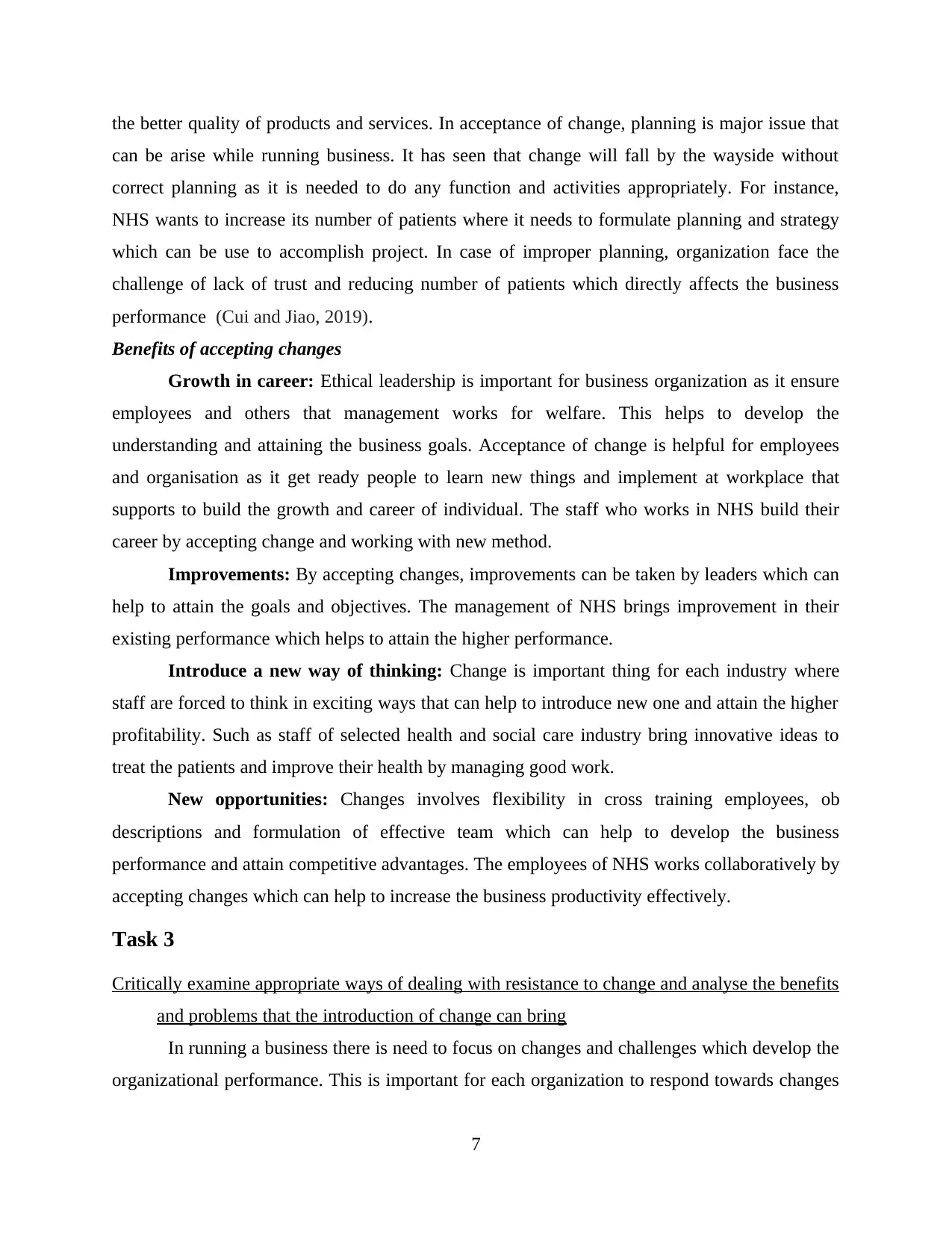
the better quality of products and services. In acceptance of change, planning is major issue that
can be arise while running business. It has seen that change will fall by the wayside without
correct planning as it is needed to do any function and activities appropriately. For instance,
NHS wants to increase its number of patients where it needs to formulate planning and strategy
which can be use to accomplish project. In case of improper planning, organization face the
challenge of lack of trust and reducing number of patients which directly affects the business
performance (Cui and Jiao, 2019).
Benefits of accepting changes
Growth in career: Ethical leadership is important for business organization as it ensure
employees and others that management works for welfare. This helps to develop the
understanding and attaining the business goals. Acceptance of change is helpful for employees
and organisation as it get ready people to learn new things and implement at workplace that
supports to build the growth and career of individual. The staff who works in NHS build their
career by accepting change and working with new method.
Improvements: By accepting changes, improvements can be taken by leaders which can
help to attain the goals and objectives. The management of NHS brings improvement in their
existing performance which helps to attain the higher performance.
Introduce a new way of thinking: Change is important thing for each industry where
staff are forced to think in exciting ways that can help to introduce new one and attain the higher
profitability. Such as staff of selected health and social care industry bring innovative ideas to
treat the patients and improve their health by managing good work.
New opportunities: Changes involves flexibility in cross training employees, ob
descriptions and formulation of effective team which can help to develop the business
performance and attain competitive advantages. The employees of NHS works collaboratively by
accepting changes which can help to increase the business productivity effectively.
Task 3
Critically examine appropriate ways of dealing with resistance to change and analyse the benefits
and problems that the introduction of change can bring
In running a business there is need to focus on changes and challenges which develop the
organizational performance. This is important for each organization to respond towards changes
7
can be arise while running business. It has seen that change will fall by the wayside without
correct planning as it is needed to do any function and activities appropriately. For instance,
NHS wants to increase its number of patients where it needs to formulate planning and strategy
which can be use to accomplish project. In case of improper planning, organization face the
challenge of lack of trust and reducing number of patients which directly affects the business
performance (Cui and Jiao, 2019).
Benefits of accepting changes
Growth in career: Ethical leadership is important for business organization as it ensure
employees and others that management works for welfare. This helps to develop the
understanding and attaining the business goals. Acceptance of change is helpful for employees
and organisation as it get ready people to learn new things and implement at workplace that
supports to build the growth and career of individual. The staff who works in NHS build their
career by accepting change and working with new method.
Improvements: By accepting changes, improvements can be taken by leaders which can
help to attain the goals and objectives. The management of NHS brings improvement in their
existing performance which helps to attain the higher performance.
Introduce a new way of thinking: Change is important thing for each industry where
staff are forced to think in exciting ways that can help to introduce new one and attain the higher
profitability. Such as staff of selected health and social care industry bring innovative ideas to
treat the patients and improve their health by managing good work.
New opportunities: Changes involves flexibility in cross training employees, ob
descriptions and formulation of effective team which can help to develop the business
performance and attain competitive advantages. The employees of NHS works collaboratively by
accepting changes which can help to increase the business productivity effectively.
Task 3
Critically examine appropriate ways of dealing with resistance to change and analyse the benefits
and problems that the introduction of change can bring
In running a business there is need to focus on changes and challenges which develop the
organizational performance. This is important for each organization to respond towards changes
7
Paraphrase This Document
Need a fresh take? Get an instant paraphrase of this document with our AI Paraphraser
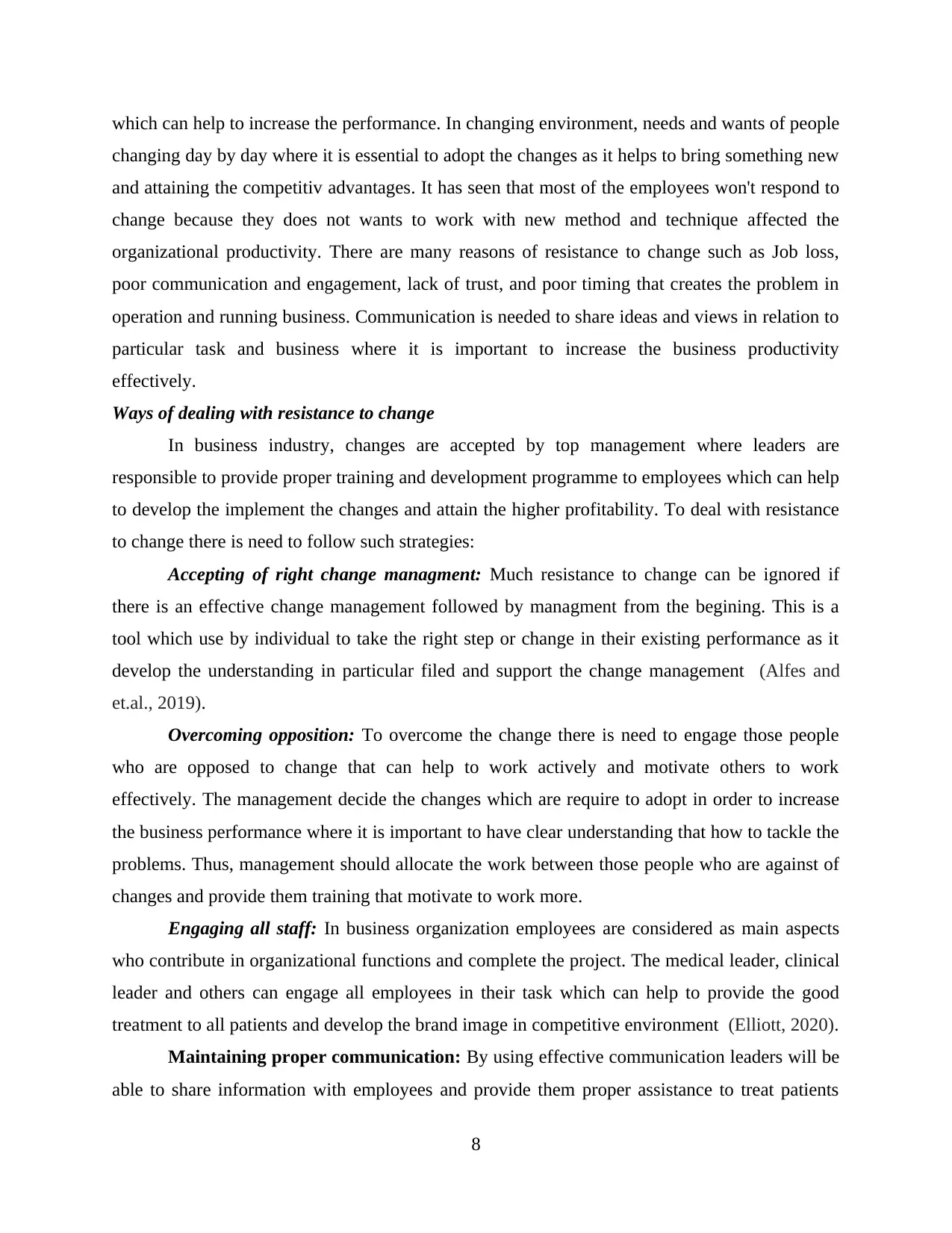
which can help to increase the performance. In changing environment, needs and wants of people
changing day by day where it is essential to adopt the changes as it helps to bring something new
and attaining the competitiv advantages. It has seen that most of the employees won't respond to
change because they does not wants to work with new method and technique affected the
organizational productivity. There are many reasons of resistance to change such as Job loss,
poor communication and engagement, lack of trust, and poor timing that creates the problem in
operation and running business. Communication is needed to share ideas and views in relation to
particular task and business where it is important to increase the business productivity
effectively.
Ways of dealing with resistance to change
In business industry, changes are accepted by top management where leaders are
responsible to provide proper training and development programme to employees which can help
to develop the implement the changes and attain the higher profitability. To deal with resistance
to change there is need to follow such strategies:
Accepting of right change managment: Much resistance to change can be ignored if
there is an effective change management followed by managment from the begining. This is a
tool which use by individual to take the right step or change in their existing performance as it
develop the understanding in particular filed and support the change management (Alfes and
et.al., 2019).
Overcoming opposition: To overcome the change there is need to engage those people
who are opposed to change that can help to work actively and motivate others to work
effectively. The management decide the changes which are require to adopt in order to increase
the business performance where it is important to have clear understanding that how to tackle the
problems. Thus, management should allocate the work between those people who are against of
changes and provide them training that motivate to work more.
Engaging all staff: In business organization employees are considered as main aspects
who contribute in organizational functions and complete the project. The medical leader, clinical
leader and others can engage all employees in their task which can help to provide the good
treatment to all patients and develop the brand image in competitive environment (Elliott, 2020).
Maintaining proper communication: By using effective communication leaders will be
able to share information with employees and provide them proper assistance to treat patients
8
changing day by day where it is essential to adopt the changes as it helps to bring something new
and attaining the competitiv advantages. It has seen that most of the employees won't respond to
change because they does not wants to work with new method and technique affected the
organizational productivity. There are many reasons of resistance to change such as Job loss,
poor communication and engagement, lack of trust, and poor timing that creates the problem in
operation and running business. Communication is needed to share ideas and views in relation to
particular task and business where it is important to increase the business productivity
effectively.
Ways of dealing with resistance to change
In business industry, changes are accepted by top management where leaders are
responsible to provide proper training and development programme to employees which can help
to develop the implement the changes and attain the higher profitability. To deal with resistance
to change there is need to follow such strategies:
Accepting of right change managment: Much resistance to change can be ignored if
there is an effective change management followed by managment from the begining. This is a
tool which use by individual to take the right step or change in their existing performance as it
develop the understanding in particular filed and support the change management (Alfes and
et.al., 2019).
Overcoming opposition: To overcome the change there is need to engage those people
who are opposed to change that can help to work actively and motivate others to work
effectively. The management decide the changes which are require to adopt in order to increase
the business performance where it is important to have clear understanding that how to tackle the
problems. Thus, management should allocate the work between those people who are against of
changes and provide them training that motivate to work more.
Engaging all staff: In business organization employees are considered as main aspects
who contribute in organizational functions and complete the project. The medical leader, clinical
leader and others can engage all employees in their task which can help to provide the good
treatment to all patients and develop the brand image in competitive environment (Elliott, 2020).
Maintaining proper communication: By using effective communication leaders will be
able to share information with employees and provide them proper assistance to treat patients
8
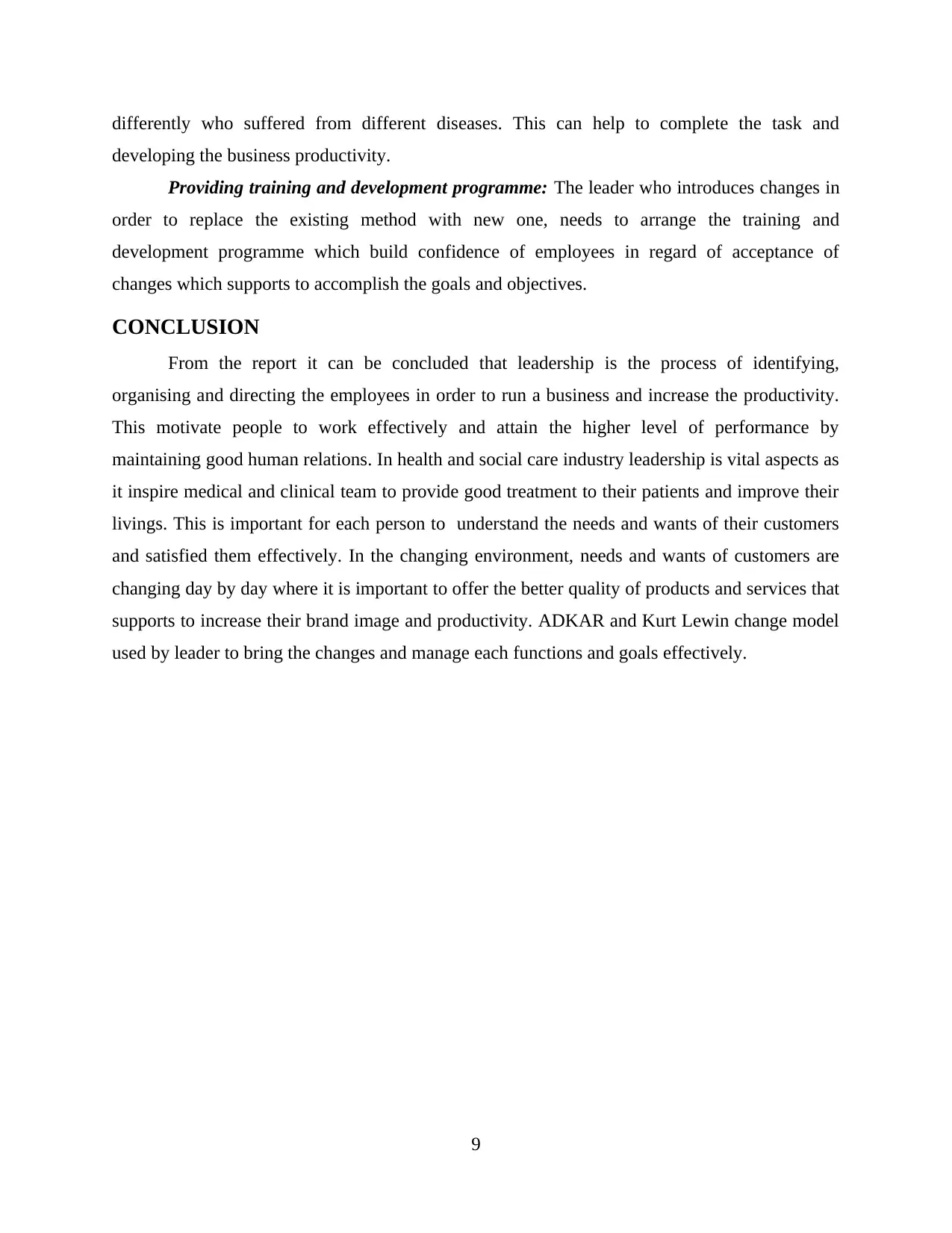
differently who suffered from different diseases. This can help to complete the task and
developing the business productivity.
Providing training and development programme: The leader who introduces changes in
order to replace the existing method with new one, needs to arrange the training and
development programme which build confidence of employees in regard of acceptance of
changes which supports to accomplish the goals and objectives.
CONCLUSION
From the report it can be concluded that leadership is the process of identifying,
organising and directing the employees in order to run a business and increase the productivity.
This motivate people to work effectively and attain the higher level of performance by
maintaining good human relations. In health and social care industry leadership is vital aspects as
it inspire medical and clinical team to provide good treatment to their patients and improve their
livings. This is important for each person to understand the needs and wants of their customers
and satisfied them effectively. In the changing environment, needs and wants of customers are
changing day by day where it is important to offer the better quality of products and services that
supports to increase their brand image and productivity. ADKAR and Kurt Lewin change model
used by leader to bring the changes and manage each functions and goals effectively.
9
developing the business productivity.
Providing training and development programme: The leader who introduces changes in
order to replace the existing method with new one, needs to arrange the training and
development programme which build confidence of employees in regard of acceptance of
changes which supports to accomplish the goals and objectives.
CONCLUSION
From the report it can be concluded that leadership is the process of identifying,
organising and directing the employees in order to run a business and increase the productivity.
This motivate people to work effectively and attain the higher level of performance by
maintaining good human relations. In health and social care industry leadership is vital aspects as
it inspire medical and clinical team to provide good treatment to their patients and improve their
livings. This is important for each person to understand the needs and wants of their customers
and satisfied them effectively. In the changing environment, needs and wants of customers are
changing day by day where it is important to offer the better quality of products and services that
supports to increase their brand image and productivity. ADKAR and Kurt Lewin change model
used by leader to bring the changes and manage each functions and goals effectively.
9
⊘ This is a preview!⊘
Do you want full access?
Subscribe today to unlock all pages.

Trusted by 1+ million students worldwide
1 out of 13
Related Documents
Your All-in-One AI-Powered Toolkit for Academic Success.
+13062052269
info@desklib.com
Available 24*7 on WhatsApp / Email
![[object Object]](/_next/static/media/star-bottom.7253800d.svg)
Unlock your academic potential
Copyright © 2020–2025 A2Z Services. All Rights Reserved. Developed and managed by ZUCOL.





